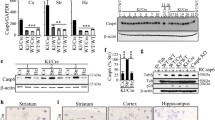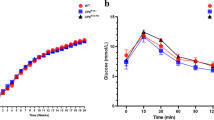Abstract
With the development of mice in which individual proteolytic enzymes have been inactivated, it has been of great interest to see how loss of these enzymes alters the processing of neuropeptides. In the course of studying changes in the peptide cholecystokinin (CCK) and other neuropeptides in several of these knockout mice, it has become clear that neuropeptide processing is complex and regionally specific. The enzyme responsible for processing in one part of the brain may not be involved in other parts of the brain. It is essential to do a detailed dissection of the brain and analyze peptide levels in many brain regions to fully understand the role of the enzymes. Because loss of these proteases may trigger compensatory mechanisms which involve expression of the neuropeptides being studied or other proteases or accessory proteins, it is also important to examine how loss of an enzyme alters expression of the neuropeptides being studied as well as other proteins thought to be involved in neuropeptide processing. By determining how loss of an enzyme alters the molecular form(s) of the peptide that are made, additional mechanistic information can be obtained. This review will describe established methods to achieve these research goals.
Access this chapter
Tax calculation will be finalised at checkout
Purchases are for personal use only
Similar content being viewed by others
References
Cain, B. M., Connolly, K., Blum, A. C. et al. (2004) Genetic inactivation of prohormone convertase (PC1) causes a reduction in cholecystokinin (CCK) levels in the hippocampus, amygdala, pons and medulla in mouse brain that correlates with the degree of colocalization of PC1 and CCK mRNA in these structures in rat brain J Neurochem 89, 307–13.
Beinfeld, M. C., Blum, A., Vishnuvardhan, D., Fanous, S., and Marchand, J. E. (2005) Cholecystokinin levels in prohormone convertase 2 knock-out mouse brain regions reveal a complex phenotype of region-specific alterations J Biol Chem 280, 38410–15.
Beinfeld, M. C., Funkelstein, L., Foulon, T. et al. (2009) Cathepsin L plays a major role in cholecystokinin production in mouse brain cortex and in pituitary AtT-20 cells: Protease gene knockout and inhibitor studies Peptides 30, 1882–91.
Cain, B. M., Wang, W. G., and Beinfeld, M. C. (1997) Cholecystokinin (CCK) levels are greatly reduced in the brains but not the duodenums of Cpefat/Cpefat mice: A regional difference in the involvement of carboxypeptidase E (Cpe) in pro-CCK processing Endocrinology 138, 4034–7.
Palkovits, M., and Brownstein, M. J. (1988) Maps and Guide to Microdissection of the Rat Brain. Elsevier Press, New York, NY.
Franklin, K. B. J., and Paxinos, G. (1997) The Mouse Brain in Stereotaxic Coordinates. Academic Press, San Diego, CA.
Eiden, L. E., Mezey, E., Eskay, R. L., Beinfeld, M. C., and Palkovits, M. (1990) Neuropeptide content and connectivity of the rat claustrum Brain Res 523, 245–50.
Livak, K. J., and Schmittgen, T. D. (2001) Analysis of relative gene expression data using real-time quantitative PCR and the 2(-Delta Delta C(T)) Method Methods 25, 402–8.
Author information
Authors and Affiliations
Corresponding author
Editor information
Editors and Affiliations
Rights and permissions
Copyright information
© 2011 Springer Science+Business Media, LLC
About this protocol
Cite this protocol
Beinfeld, M.C. (2011). Characterization of Impaired Processing of Neuropeptides in the Brains of Endoprotease Knockout Mice. In: Mbikay, M., Seidah, N. (eds) Proprotein Convertases. Methods in Molecular Biology, vol 768. Humana Press. https://doi.org/10.1007/978-1-61779-204-5_16
Download citation
DOI: https://doi.org/10.1007/978-1-61779-204-5_16
Published:
Publisher Name: Humana Press
Print ISBN: 978-1-61779-203-8
Online ISBN: 978-1-61779-204-5
eBook Packages: Springer Protocols




